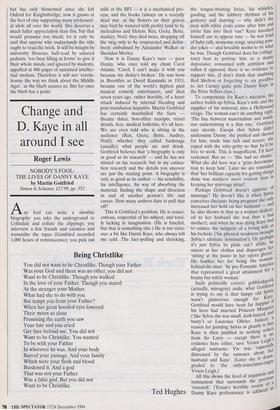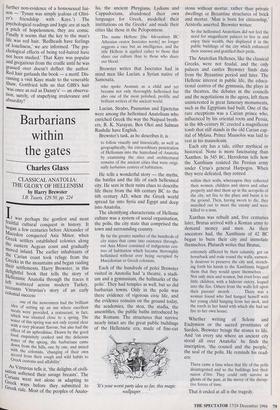Change and D. Kaye in all around I see
Roger Lewis
NOBODY'S FOOL: THE LIVES OF DANNY KAYE by Martin Gottfried Simon & Schuster, £17.99, pp. 352 Any fool can write a showbiz biography: you take the underground to Colindale and collate the clippings; you interview a few friends and enemies and transcribe the tapes (Gottfried recorded 1,000 hours of reminiscence); you pick out stills at the BFI — it is a mechanical pro- cess, and the books (always on a recently dead star, as the flowers on their graves may best be watered with profit) tend to be meticulous and lifeless. Rex, Greta, Bette, Audrey, Noel: they died twice, dropping off the twig only to be resurrected and defini- tively embalmed by Alexander Walker or Sheridan Morley.
Now it is Danny Kaye's turn — poor Danny, who once told my chum Carol Adams, 'Carol, I can't make it with you because my dickie's broken.' He was born in Brooklyn as David Kaminski in 1913, became one of the world's highest paid musical comedy entertainers, and died seven years ago, rather horribly, of a heart attack induced by internal bleeding and post-transfusion hepatitis. Martin Gottfried has certainly marshalled the facts theatre dates, box-office receipts, travel details, fees, medical bulletins, it's all here. We are even told who is sitting in the audience (Rex, Greta, Bette, Audrey, Noel); whether they called backstage (usually); what people ate and drank. Gottfried believes that 'a biography is only as good as its research' — and he has not stinted on his research; but in my estima- tion research and the details you uncover are just the starting point. A biography is only as good as its author — his sensibility, his intelligence, his way of absorbing the material, finding the shape and direction in and of another person's life and career. How many authors dare to pull that off?
This is Gottfried's problem. He is consci- entious, respectful of his subject, and total- ly lacking in imagination. (He is fanciful, but that is something else.) He is too virtu- ous: a bit like Danny Kaye, who always left me cold. The face-pulling and shrieking, the tongue-twisting lyrics, his whistles, goofing, and the rubbery rhythms of his gestures and dancing — why didn't the men with white coats come after him and invite him into their van? Kaye knocked himself out to appear cute — he was fond of baby talk, nonsense songs, sneezing pow- der jokes — and loveable seems to be what he was. Though Gottfried does his (obliga- tory) best to portray him as a manic depressive, consumed with ambition and sullen if opposed, there is no evidence to support this. (I don't think that snubbing Red Skelton or forgetting to say goodbye to Art Carney quite puts Danny Kaye in the Peter Sellers class.) To compensate for Kaye's niceness, the author builds up Sylvia, Kaye's wife and the supplier of his material, into a Hollywood virago. The woman can't do anything right. `The line between maternalism and insidi- ous undermining is a thin one,' Gottfried says sternly. Except that Sylvia didn't undermine Danny; she pushed and shoved for him, made him rich and secure; she coped with the nitty-gritty so that he'd be free to work. This is magnificent, I'd have reckoned. But no — 'She had no shame. What she did have was a 'grim determina- tion to keep him'. Later we are reminded that 'her brilliant capacity for getting things done was nowhere more evident than in keeping her marriage intact'. Perhaps Gottfried doesn't approve of marriage? He doesn't like it when Sylvia conceives (because being pregnant she oniY, increased her hold on her husband — and he also throws in that as a woman dedicat- ed to her husband she was thus a bad mother); and when he was dying Kaye had to endure the indignity of a loving wife at his bedside (`his physical weakness brought Sylvia's ultimate domination'). Or perhaps it's just Sylvia he plain can't abide; he sneers at her clothes and disparages her `sitting at the piano in her opera gloves • He loathes her for being the woman- behind-the-man: 'In pre-Feminist America that represented a great attainment for a brainy but wifely woman.' Such politically correct gobbledygook, (actually, misogyny) aside, what Gottfrieo is trying to say is that lumpy old Sylvia wasn't glamorous enough for KaY!'f Gottfried would have been far happier 't his hero had married Princess Margared (like Sylvia she was small, dark-haired, and busty') or Laurence Olivier. Indeed, a reason for painting Sylvia as ghastly is Oa_ Kaye is then justified in seeking solace from Sir Larry — except there is 11,s evidence here either, save Vivien Leiga„ alleged tantrums: Viv was 'especiallY_. distressed by the rumours about her husband and Kaye'. (Later she is Ovvrf, graded to 'the only-sometimes-ang'.'
Vivien Leigh.)' r and All this shows the level of arguinerl- ,s insinuation that surrounds the Preci?"3 `research'. (Tynan's horrible review of Danny Kaye performance is adduced as further non-evidence of a homosexual liai- son — 'Tynan was simply jealous of Olivi- er's friendship with Kaye.') The psychological readings and logic are at such a pitch of hopelessness, they are comic. Finally it seems that the key to the man's life was red hair. 'Redheads have feelings of loneliness,' we are informed. 'The psy- chological effects of being red-haired have not been studied.' That Kaye was popular and gregarious from the cradle until he was grassed over doesn't deflect the author. Red hair garlands the book — a motif. Dis- cussing a visit Kaye made to the venerable Shaw, Gottfried tells us that GBS's hair `was once as.red as Danny's' — an observa- tion, surely, of stupefying irrelevance and absurdity?











































































































 Previous page
Previous page